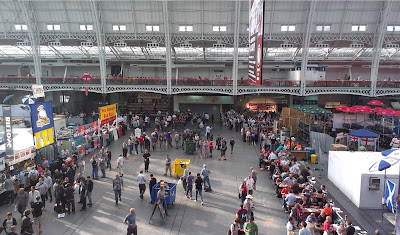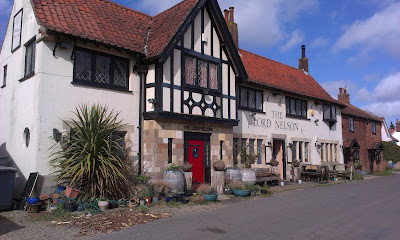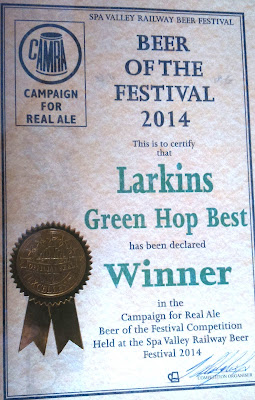The book contains first-hand accounts from CAMRA members, brewers, licensees, and industry observers, detailing the highs and lows of the Campaign. Beer writer, Laura Hadland, was specially commissioned to write the book, and has done a first-class job. This is despite much of the research having to be conducted remotely, due to the various lock-down restrictions.
"50 years of CAMRA" is neatly and logically structured and starts off with an explanation as to why cask ale needed saving. This is perhaps the crux of not just the book, but CAMRA itself, because the unique set of circumstances that existed at the time, provided the reasons behind the need for an organisation such as CAMRA.
What then follows are a set of rather broad headings, about how the campaign works, in relation to beer, breweries, and pubs. The book then ends with a look at CAMRA today. These headings encompass a wide range of related sub-headings, covering topics and developments, laid out in chronological order. These demonstrate how CAMRA has evolved over the past half century. The first half was the most interesting as it was the part of the campaign that I really identified with. Back in the late 70’s – early 80’s, it seemed that CAMRA had become an unstoppable force, and what we (because it was, we) were doing was not only worthwhile, but somehow noble as well. I appreciate that sounds rather pretentious now, but when looked at against the increase in interest, of all matters relating to beer, that CAMRA inspired, I don’t regard it as an exaggeration. The same applies to the huge increase in the number of breweries, not just here in the UK, but globally and particularly in the United States. I don’t intend to cover all the topic covered in Laura’s book, although there are a number that I would like to explore further. One story, which makes interesting reading, is the development of beer festivals - events that we now take for granted, Cambridge was one of the first off, the mark in 1974, with a successful festival that acted as the template for future CAMRA events. A year later the Covent Garden Beer Exhibition, became the first national beer festival.I was fortunate to have attended this pioneering event, and two years later I was present at the first Great British Beer Festival, held at London’s Alexandra Palace. I have since attended countless beer across the southeast, worked at several, and even helped to organise the odd one or two.
Organising protest marches, either through towns, or outside breweries earmarked for closure, was another favourite tactic during the early days of CAMRA. Laura recounts the “mock funerals” held in memory of a brewery about to be closed, and I recall attending such a demonstration at Whitbread’s historic Chiswell Street Brewery, in the City of London. Beer had been brewed at this location for over 200 years, before the brewing giant closed the plant in 1976.Meeting up with fellow members, concerned at the loss of the country’s brewing heritage, was great fun, and it felt like we were not just getting our point across, but by drawing people’s attention to these closures, we were making a difference. I was certainly proud to be associated with such like-minded individuals, and regarded them as “comrades in arms,” for want of a better term.
Those days have all gone now, the fun has gone out of the campaign and CAMRA has become dull and boring. Like a lengthy marriage that is missing its spark and slowly going off the rails, CAMRA seemed to be just going through the motions. Ticking boxes, surveying pubs for the GBG, attending the Great British Beer Festival, campaigning for Mild during the month of May and cider during the autumn, the whole year was marked out by CAMRA routines and rituals, that hardly varied from one year to the next.
As Laura points out, CAMRA changed from a campaigning organisation to a lobbying one. Sure, the campaign has the ear of parliament and of the brewing industry, but the heart and soul has completely gone from the campaign, the organisation takes itself far too seriously, and like the Conservative party, is riddled with internal politics.There was the half-hearted attempt at reform, dubbed the Revitalisation Campaign, which culminated in a number of Special Resolutions being put to CAMRA’s National Conference. The majority of these passed, but the most controversial resolution fell at the last hurdle, when it narrowly failed to achieve the 75% majority required to change the campaign’s articles of association.
The resolution would have meant that CAMRA would “act as the voice and represent the interests of all pub goers and beer, cider and perry drinkers.” It would have made CAMRA a much broader church, embracing all the above groups. The motion failed by the narrowest of margins, 72%, and just short of the 75% % required. Similar guidelines should, of course, have applied to the 2016 referendum on Britain’s EU membership, but that’s another story.Many in CAMRA regarded the failure of this Special Resolution as a missed opportunity for the campaign. An opportunity which would have taken the organisation forward, and beyond the somewhat narrow remit of “Real Ale.” For an individual like me, already disillusioned at the direction the group was taking, it was the final straw, and I cancelled my membership at the end of 2019.
These issues aside, CAMRA over the course of the past 50 years, has achieved far more than those four young journalists could have envisioned, when they sketched out those original hazy details for the campaign, on their lads’ holiday to Ireland.I am proud of the role I played within this success and am honoured to have been a member of Europe’s largest, single-issue consumer movement for 45 years. During this time, I have made many good friends, visited some amazing pubs and breweries and generally, have enjoyed a thoroughly good time. So, to discover more about this unique and ground-breaking organisation, I thoroughly recommend getting a copy of “50 years of CAMRA,” whether you are a CAMRA member or not.
Finally, a little piece of doggerel from a Christmas card, sent in the very early days of the campaign, by one of CAMRA’s four founders.
"Whether in city bar you sup, Or in village vault you get tanked up, Be on your guard against bad ale, Or you’ll never live to tell the tale………….of CAMRA."








2 comments:
I bought a copy of this last year but didn't end up writing a review as there was no point in just writing an anodyne descriptive piece, but on the other hand it does have a lot in its favour and didn't deserve a negative response.
You are right to say that much of what CAMRA does now is just going through the same routines and it lacks any compelling sense of mission. I did say at the time of its 50th anniversary that it seemed to be acting on a whole range of fronts, some of which were in fact mutually contradictory.
And revitalisation has produced an satisfactory halfway house where it is no longer just a Campaign for Real Ale, but neither is it a campaign for all good beer regardless of dispense or storage method.
One plus point is that the book does recognise that the Beer Orders turned out to be a poisoned chalice that did far more harm than good. Had I been actively involved in writing or blogging at the time I wonder whether I would have predicted that.
The Beer Orders were definitely a poisoned chalice, although very few people realised this at the time. Some clever, but very duplicitous advisors managed to persuade the Big Brewers, to turn their backs on centuries of brewing heritage, and become purely pub-owning companies instead.
Not many people saw that coming - I certainly didn't, and neither, it seems, did CAMRA!
Post a Comment